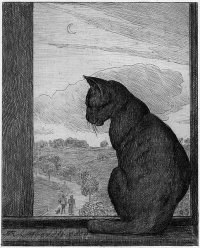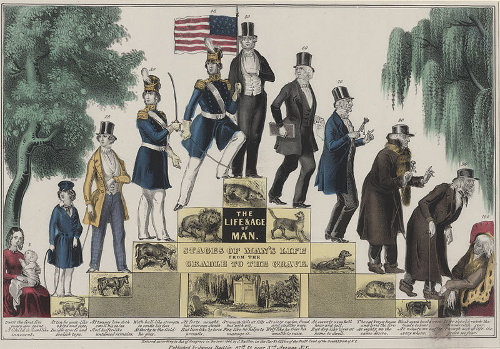When I am dead you’ll find it hard,
Said he,
To ever find another man
Like me.
What makes you think, as I suppose
You do,
I’d ever want another man
Like you?
— Eugene Fitch Ware, Some of the Rhymes of Ironquill, 1900
When I am dead you’ll find it hard,
Said he,
To ever find another man
Like me.
What makes you think, as I suppose
You do,
I’d ever want another man
Like you?
— Eugene Fitch Ware, Some of the Rhymes of Ironquill, 1900
Put the integers 1, 2, 3, … n in any order and call them a1, a2, a3, … an. Then form the product
P = (a1 – 1) × (a2 – 2) × (a3 – 3) … × (an – n).
Now: If n is odd, prove that P is even.

I don’t know what to make of this — on Sept. 7, 1950, the London Times reported that a 10-month-old kitten had climbed the Matterhorn.
The story, “from our correspondent,” claims that the black-and-white kitten lived in the Hotel Belvedere at 10,820 feet, where he would watch departing alpinists as they left for the summit. One morning, apparently, he decided to follow them. “After a long and lonely climb” he reached the Solway hut at 12,556 feet, and the next day “bivouacked in a couloir above the shoulder.” A climbing party passed him on the third day, and he caught them up at the summit (14,780 feet), “miauing and tail up,” and was rewarded with a share of their meal. He was carried back down in a rucksack.
This is all reported very earnestly, and there’s even a photograph of the cat, but I can’t find a corroborating account anywhere. Both The Canadian Nurse and The Veterinary Record picked up the story, but they both credit the Times. The Guinness Book of World Records cited the cat for its feat, but presumably they’re relying on the same account.
Is this preposterous? Do I overestimate the Matterhorn? Do I underestimate kittens? Can anyone shed any light on this?
perpilocutionist
n. one who expounds on a subject of which he has little knowledge
In 1983, Jacob Henderson was convicted of burglarizing a Maaco paint shop in Jackson, Miss. He appealed on the ground that the indictment was illiterate:
The Grand Jurors for the State of Mississippi, … upon their oaths present: That Jacob Henderson … on the 15th day of May, A.D., 1982.
The store building there situated, the property of Metro Auto Painting, Inc., … in which store building was kept for sale or use valuable things, to-wit: goods, ware and merchandise unlawfully, feloniously and burglariously did break and enter, with intent the goods, wares and merchandise of said Metro Auto Painting then and there being in said store building unlawfully, feloniously and then and there being in said store building burglariously to take, steal and carry away; And
One (1) Polaroid Land Camera,
One (1) Realistic AM/FM Stereo Tuner
One (1) Westminster AM/FM radio
One (1) Metal Box and contents thereof,… the property of the said Metro Auto Painting then and there being in said store building did then and there unlawfully, feloniously and burglariously take, steal and carry away the aforesaid property, he, the said Jacob Henderson, having been twice previously convicted of felonies, to-wit: … .
Henderson called an English teacher as an expert witness. She pointed out that the district attorney’s indictment doesn’t charge Henderson with any wrongdoing; instead it charges the merchandise itself with breaking into the paint store.
“This case presents the question whether the rules of English grammar are a part of the positive law of this state,” wrote Justice Robertson for the court. “If they are, Jacob Henderson’s burglary conviction must surely be reversed, for the indictment in which he has been charged would receive an ‘F’ from every English teacher in the land.”
“Though grammatically unintelligible, we find that the indictment is legally sufficient and affirm, knowing full well that our decision will receive of literate persons everywhere opprobrium as intense and widespread as it will be deserved.”

“The whole scheme of things is turned wrong end to. Life should begin with age & its privileges and accumulations, & end with youth & its capacity to splendidly enjoy such advantages. As things are now, when in youth a dollar would bring a hundred pleasures, you can’t have it. When you are old, you get it & there is nothing worth buying with it then. It’s an epitome of life. The first half of it consists of the capacity to enjoy without the chance; the last half consists of the chance without the capacity.”
— Mark Twain, letter to Edward Dimmitt, July 19, 1901
Two men are brothers-in-law if one is married to the other’s sister. What is the largest possible group of men in which each is brother-in-law to each of the others?
Can a fraction whose numerator is less than its denominator be equal to a fraction whose numerator is greater than its denominator? If not, how can
In the proportion
+6 : -3 :: -10 : +5
is not either extreme greater than either mean? What has become of the old rule, ‘greater is to less as greater is to less’?
— William Frank White, A Scrap-Book of Elementary Mathematics, 1908

Green River, Wyo., is certainly neighborly: In 1994, when NASA determined that up to six meteors might strike Jupiter, Green River’s city council designated an airstrip south of town as the Greater Green River Intergalactic Spaceport. They asked NASA to broadcast the news to any fleeing Jovians and warned residents to “prepare themselves to make welcome any refugees who might cast themselves upon our mercy.”
Mayor George Eckman told the Rock Springs Rocket-Miner, “I feel it is a gesture that could be made and should be made by someone on the planet Earth to fellow citizens of the solar system.”
The two council members who opposed the resolution pointed out that the region already has a problem with illegal aliens and noted the local housing shortage. But the mile-long runway remains open.
LONDON — Mrs. Kathleen Cameron, 19, was amazed at how hard and fast carpenters worked to tear down the pre-fab house next door at 10 Jardin Street.
‘I didn’t become suspicious of the four men until they skipped their tea break to continue working,’ she said.
Sure enough, the carpenters were thieves who stole the five-room house in its entirety. By the time police arrived, they were gone.
— Lubbock Avalanche-Journal, Sept. 12, 1971